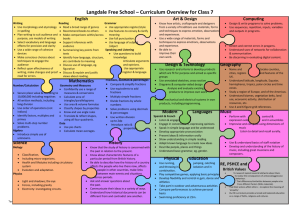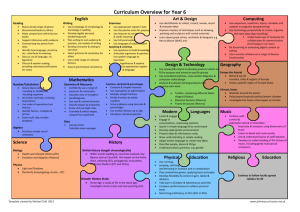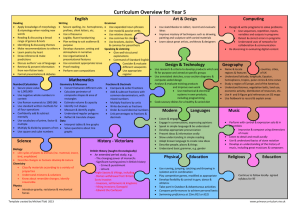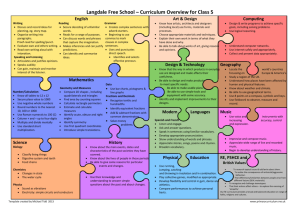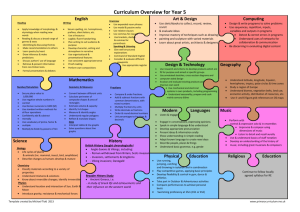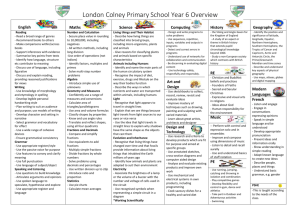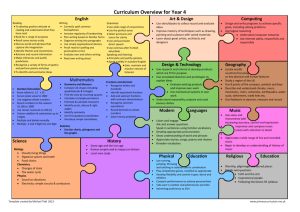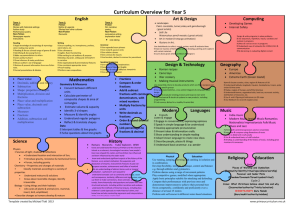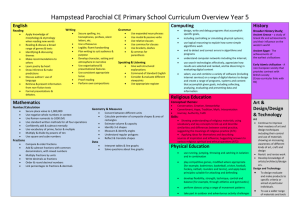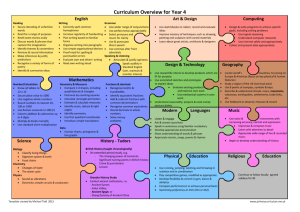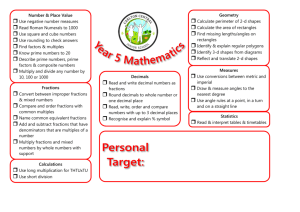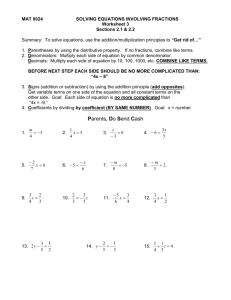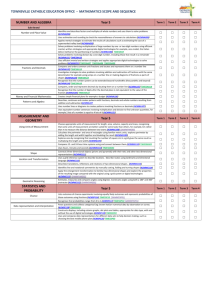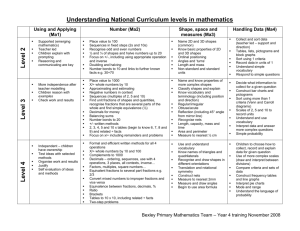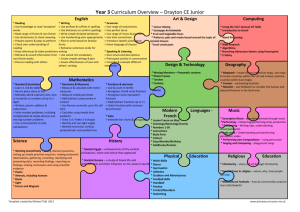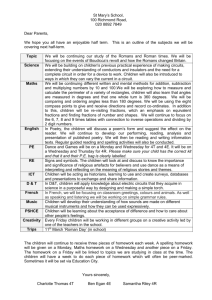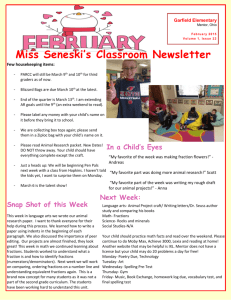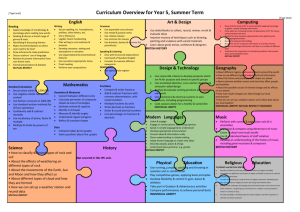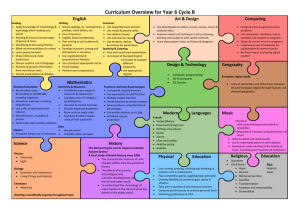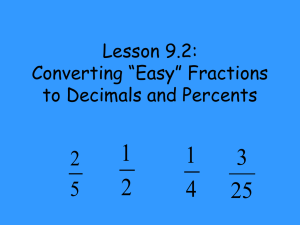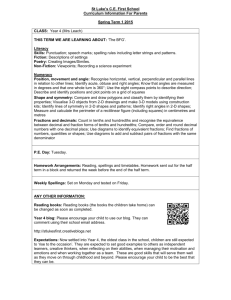Langdale Free School – Curriculum Overview for Class 6
advertisement
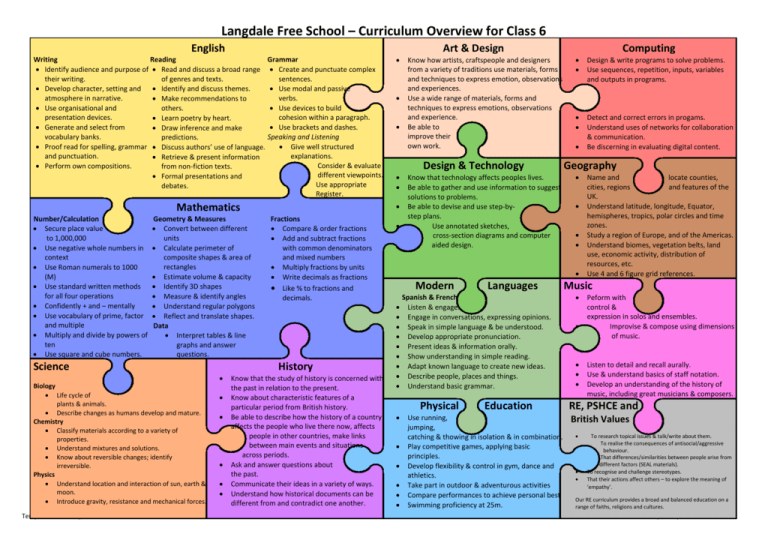
Langdale Free School – Curriculum Overview for Class 6 English Art & Design Writing Reading Grammar Identify audience and purpose of Read and discuss a broad range Create and punctuate complex their writing. of genres and texts. sentences. Develop character, setting and Identify and discuss themes. Use modal and passive atmosphere in narrative. verbs. Make recommendations to Use organisational and others. Use devices to build presentation devices. cohesion within a paragraph. Learn poetry by heart. Generate and select from Use brackets and dashes. Draw inference and make vocabulary banks. Speaking and Listening predictions. Proof read for spelling, grammar Discuss authors’ use of language. Give well structured and punctuation. explanations. Retrieve & present information Consider & evaluate Perform own compositions. from non-fiction texts. different viewpoints. Formal presentations and Use appropriate debates. Register. Mathematics Number/Calculation Secure place value to 1,000,000 Use negative whole numbers in context Use Roman numerals to 1000 (M) Use standard written methods for all four operations Confidently + and – mentally Use vocabulary of prime, factor and multiple Multiply and divide by powers of ten Use square and cube numbers. Geometry & Measures Convert between different units Calculate perimeter of composite shapes & area of rectangles Estimate volume & capacity Identify 3D shapes Measure & identify angles Understand regular polygons Reflect and translate shapes. Data Interpret tables & line graphs and answer questions. Science History Biology Life cycle of plants & animals. Describe changes as humans develop and mature. Chemistry Classify materials according to a variety of properties. Understand mixtures and solutions. Know about reversible changes; identify irreversible. Physics Understand location and interaction of sun, earth & moon. Introduce gravity, resistance and mechanical forces. Template created by Michael Tidd 2013 Fractions Compare & order fractions Add and subtract fractions with common denominators and mixed numbers Multiply fractions by units Write decimals as fractions Like % to fractions and decimals. Know that the study of history is concerned with the past in relation to the present. Know about characteristic features of a particular period from British history. Be able to describe how the history of a country affects the people who live there now, affects people in other countries, make links between main events and situations across periods. Ask and answer questions about the past. Communicate their ideas in a variety of ways. Understand how historical documents can be different from and contradict one another. Know how artists, craftspeople and designers from a variety of traditions use materials, forms and techniques to express emotion, observations and experiences. Use a wide range of materials, forms and techniques to express emotions, observations and experience. Be able to improve their own work. Design & Technology Know that technology affects peoples lives. Be able to gather and use information to suggest solutions to problems. Be able to devise and use step-bystep plans. Use annotated sketches, cross-section diagrams and computer aided design. Computing Design & write programs to solve problems. Use sequences, repetition, inputs, variables and outputs in programs. Detect and correct errors in progams. Understand uses of networks for collaboration & communication. Be discerning in evaluating digital content. Geography Modern Spanish & French Listen & engage. Engage in conversations, expressing opinions. Speak in simple language & be understood. Develop appropriate pronunciation. Present ideas & information orally. Show understanding in simple reading. Adapt known language to create new ideas. Describe people, places and things. Understand basic grammar. Physical Languages Education Use running, jumping, catching & thowing in isolation & in combination. Play competitive games, applying basic principles. Develop flexibility & control in gym, dance and athletics. Take part in outdoor & adventurous activities Compare performances to achieve personal best Swimming proficiency at 25m. Name and locate counties, cities, regions and features of the UK. Understand latitude, longitude, Equator, hemispheres, tropics, polar circles and time zones. Study a region of Europe, and of the Americas. Understand biomes, vegetation belts, land use, economic activity, distribution of resources, etc. Use 4 and 6 figure grid references. Music Peform with control & expression in solos and ensembles. Improvise & compose using dimensions of music. Listen to detail and recall aurally. Use & understand basics of staff notation. Develop an understanding of the history of music, including great musicians & composers. RE, PSHCE and British Values To research topical issues & talk/write about them. To realise the consequences of antisocial/aggressive behaviour. That differences/similarities between people arise from different factors (SEAL materials). To recognise and challenge stereotypes. That their actions affect others – to explore the meaning of ‘empathy’. Our RE curriculum provides a broad and balanced education on a range of faiths, religions and cultures. www.primarycurriculum.me.uk Template created by Michael Tidd 2013 www.primarycurriculum.me.uk
